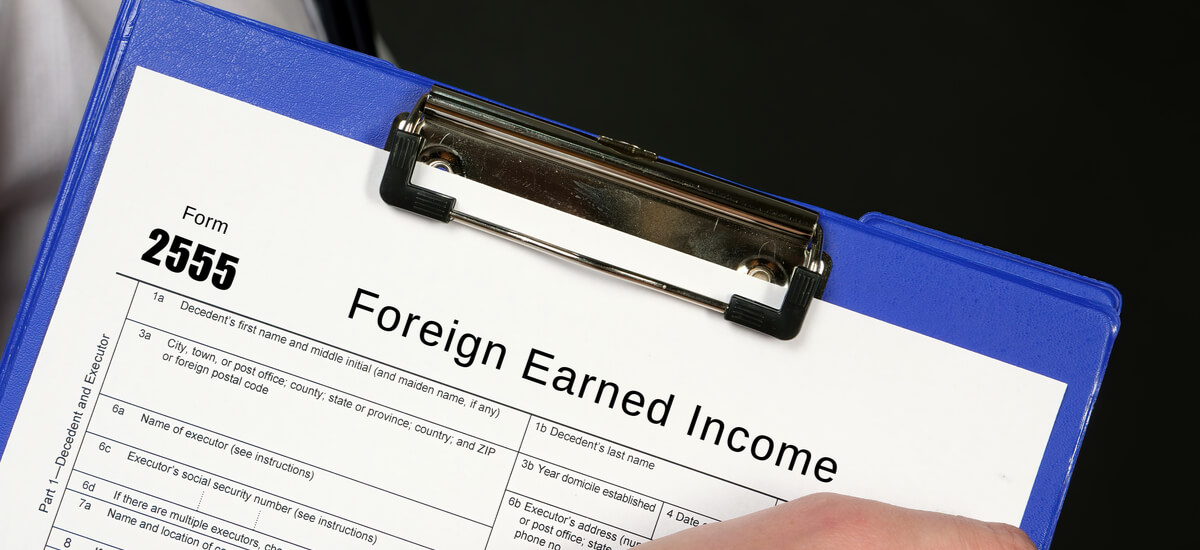U.S. Consulate in Naha: Services, Location & Appointments
Find the address, services, and contact info for the U.S. consulate in Naha. Get help with visas, passports, and other consular services.

| This publication is provided for general information purposes and does not constitute legal, tax or other professional advice from Wise US Inc. or its affiliates, and it is not intended as a substitute for obtaining business advice from a Certified Public Accountant (CPA) or tax lawyer |
|---|
Whether you’re freelancing from Florence, trading in Tokyo, or busking in Bali, the IRS wishes you well! They would also like to remind you that for tax purposes they see little difference between US citizens and resident aliens living abroad compared to those living in the US.
If this is news to you or if you’re not on top of all the details, don’t worry. In this article, we cover what you need to know as a US citizen or resident alien living abroad with respect to taxes. We’ll also look at how Wise can help you if you need to pay your taxes or receive your tax refund.
| This article has been written in collaboration with Brittany Lally, a Managing CPA at Bright!Tax US Expat Tax Services. |
|---|
If you’re an American expat, you’re still subject to US taxes. The US taxes your worldwide income from all sources no matter where you live. And the only way to leave US tax behind is to renounce your citizenship, even if you're a dual citizen.
But just because you’re subject to taxes, doesn't mean you always have to file a return. Your filing requirement depends on your income, filing status, and age. And on the bright side, when you do file a return, you may end up with a refund or be eligible for exemptions and tax credits - see sections below:¹
| Filing status | 2024 tax year | 2025 tax year |
|---|---|---|
| Single | $14,600 | $15,000 |
| Married, filing jointly | $29,200 | $30,000 |
| Married, filing separately | $14,600 | $15,000 |
| Head of household | $21,900 | $22,500 |
|
|---|
US resident aliens are also subject to US taxes on their worldwide income. Filing requirements are the same as for US citizens - check your filing status, age, and income to see if you must file a return.
- Green Card Test: Anyone who was a lawful permanent resident of the US at any time during the calendar year
- Substantial Presence Test: You were in the US for 31 days during the current calendar year and were in the US for a total of 183 days during the current and preceding two years - but only count ⅓ of the days in the first preceding year and only ⅙ of the days in the second preceding year.
While living abroad, it is important to take advantage of the tax exclusions and credits that can reduce your US tax liability.
You might be wondering how much foreign income is tax-free in the USA - and the IRS does provide for citizens living abroad various tax mechanisms to offset potential double taxation (paying taxes both in the country you reside in and in the US).

If you claim the Foreign Earned Income Exclusion by filing IRS Form 2555, then you don't have to pay tax on your first $126,500 of foreign income for the 2024 tax year (the exclusion amount is $130,000 for the 2025 tax year). This exclusion can only be taken on earned income.
Foreign income earned indirectly cannot be excluded using the FEIE. This includes income such as dividends, interest, capital gains, gambling, rent, and scholarships.
You can deduct or exclude certain rental housing expenses from your gross income while living abroad by claiming the Foreign Housing Exclusion. Similar to the FEIE, this exclusion is also taken on Form 2555.³ If you’re self-employed and paying for your foreign housing, you can claim the Foreign Housing Deduction.³
- The Bona Fide Residence Test: You’re a US citizen or resident alien who resides in a foreign country for a full tax year.
- The Physical Presence Test: You’re a US citizen or resident alien who is physically present in a foreign country or countries for at least 330 full days during a 12-month period.

If you had to pay or have accrued foreign income taxes, you can claim the Foreign Tax Credit on IRS Form 1116.⁴
To qualify for the Foreign Tax Credit, the tax needs to be imposed on you, you must have actually paid it or accrued it, and it must be a form of income tax.
You will only get a credit on the final liability - less any refunds provided by the foreign government on the tax.⁵
Foreign taxes also include taxes paid to US possessions like Puerto Rico and the US Virgin Islands.
| Note: You can’t apply the Foreign Earned Income Exclusion and the Foreign Tax Credit to the same income. (Your expat tax advisor will advise you which one it’s most beneficial for you to claim). |
|---|
As a citizen or resident alien of the US, you may also be eligible for certain tax benefits, and rate reductions arising from the income tax treaties the US has with several countries. (See a full list of treaty countries on the IRS website.)
Each treaty is unique, but all treaties serve the same purpose: to eliminate double taxation.
Treaties often cover topics such as how retirement income will be taxed and which country capital gains will be taxed in. The form used to claim a tax treaty provision is Form 8833, and it must be submitted alongside your tax return.
One major limitation of tax treaties is that many contain a clause called the Savings Clause, which prevents US citizens from applying the treaty to their tax return, with language allowing the US to tax its citizens as if the treaty did not exist.

Paying for your US taxes or receiving a tax refund can be tricky - the payment options are often slow and costly, and this doesn’t get better when you’re not in the country and/or manage different currencies.
Whether you’re a US expat, a resident alien, or you have a foreign business, Wise is for you: with a Wise account, you can either pay your taxes from abroad or receive your tax refund easily.
And if you manage more than one currency, you’ll save a lot on exchange rate mark-ups and conversion fees.
When you fill out your tax forms, use your Wise USD Account and routing numbers.
| 🎯 You can find them under ‘Account Details’. This will let you: |
|---|
|
Wise has no subscription fees or minimum balance requirements, and you can set up an account in minutes²².
You can send, receive, hold and spend your money in multiple currencies, always with the real exchange rate, and just with a small and transparent fee²³.
Get a Wise Account
in minutes 🚀
Filing a tax return is often just the start for US expats. In many cases you also need to share further financial information. Some of the most common filings include:
If you own one or more foreign financial accounts and the total, combined value of those account balances exceeds $10,000 at any point during the reporting year, then you'll need to file an FBAR (Report of Foreign Bank and Financial Accounts).⁶
Financial accounts include savings accounts, checking accounts, term deposits, brokerage accounts, mutual funds, and insurance policies with a cash value.⁶
The FBAR has been around since the 1970s, but enforcement has become stricter in recent years. It was introduced to crack down on money laundering, tax evasion, and other criminal activities.
The FBAR is submitted separately from your tax return to the Financial Crimes Enforcement Network (FinCEN), not the IRS.⁶ It is submitted electronically using FinCEN’s BSA E-Filing System.
The official due date is April 15th; however, there is an automatic extension until October 15th.
The penalty for not filing the FBAR is severe and can range from $10,000 to over $100,000.⁶
If you need to file a US tax return, you may also need to report on your foreign financial assets if the aggregate value of those assets exceeds the prescribed threshold.
For a single person living abroad, the threshold is $200,000 in foreign assets held at the end of the year or $300,000 at any point during the year. If you file jointly with your spouse, it is $400,000 at the end of the year or $600,000 at any point during the year.⁷
Filing for FATCA is done on Form 8938 which is submitted with the annual tax return (ex. Form 1040).⁸ The IRS also requires foreign financial institutions to report directly their US taxpayers’ foreign financial accounts.
Foreign financial assets include bank accounts, foreign stock and securities, foreign financial instruments, contracts with non-US persons, and interests in foreign entities.⁷
You don’t need to report any foreign real estate you own under FATCA unless the real estate is held through a foreign corporation, partnership, trust, or other entity.⁹
If you sell any real estate during a reporting period then you’ll need to include that income when assessing your taxable income for your tax return.
Every US state has different tax laws, but generally, you only need to pay state taxes if you had ties in the state during the reporting year.
Important to note: “ties” can include residency of the state, which often doesn’t have anything to do with how much time you spend there.
| Having ties (or domicile) to a state may also include any of the following: |
|---|
|
Note: keep in mind that the list above is prescriptive, not exhaustive. Please check with your expat tax advisor what's the best course of action for your scenario and your ties — or lack of — with the state
If you last lived in a state with no income tax like Florida or Alaska, filing state taxes is not required, but do be sure to check that there are no taxes on other sources of income.
Some states require a bit more work as their tax laws surrounding tax residency get more complicated - we’re looking at you California, South Carolina, New Mexico, and Virginia.
In the eyes of the IRS, there are two particular types of foreign companies owned by US citizens that can trigger complex reporting:
- Passive Foreign Investment Companies (PFIC)
- Controlled Foreign Corporations (CFCs)
Both are subject to US taxation but require filing different forms.¹⁰
A passive foreign investment company is a foreign company that generates 75 percent of its gross income from passive investments (this is called the ‘Income Test’) or 50 percent of its assets, on average, are from passive sources (this is called the ‘Asset Test’).¹¹ Passive income is income that the company did not provide direct services for, such as from dividends.¹¹
If you’re a shareholder of a passive foreign investment company (PFIC) and you receive distributions from the PFIC, recognize a gain on the stock, or if it is marked to market, then you must file Form 8621.¹²
If you’re a shareholder or an officer or director in a foreign corporation that is more than 50 percent owned or controlled by US shareholders (or owned by one or more US corporations) then you may need to file Form 5471.¹³ ¹⁴ The rules for CFCs are quite specific, and it is best to seek advice from a tax advisor.
Foreign registered single-owner LLCs are not automatically considered disregarded entities that can be reported on Form 1040 like US registered LLCs.
If you operate a foreign branch or own a foreign company, you should consider using Form 8832 to have the company treated as a disregarded entity and then use Form 8858¹⁵ when reporting on your company to the IRS. The forms are also filed alongside your individual tax return.¹⁶

Americans living abroad still have to pay any tax they owe by Monday, April 15 in 2025, however, most expats won’t owe any US tax once they file. The filing deadline for expats is actually 2 months later, June 16, to give you time to file your foreign taxes first.
If you still need more time to file, you can request a further extension to Wednesday, October 15. FBAR filing, meanwhile, is due by October 15.¹⁷
The good news is that if you miss all the deadlines or if you’re due a refund there are no failure to pay penalties.¹⁸
But if you owe tax and are late, then you will have to pay penalties and interest. Generally, the late-filing penalty starts at 5 percent of the tax you owe for each month the tax return is late - up to a maximum of 25 percent.¹⁹
Failure to submit some specific forms, such as the FBAR, can also result in penalties.⁶
If you’re a US citizen living abroad and haven’t filed a tax return for years, you may qualify for an IRS amnesty program called the Streamlined Procedure that lets you catch up penalty-free.²⁰
This program is available for both US individual taxpayers residing outside and inside the country whose finances abroad have not been properly reported.
In order to benefit from the program, the IRS states that taxpayers need to certify that their "failure to report foreign financial assets and pay all tax due in respect of those assets did not result from willful conduct on their part".²¹
 |
|
Sources:
Sources checked on 02.21.2025
*Please see terms of use and product availability for your region or visit Wise fees and pricing for the most up to date pricing and fee information.
This publication is provided for general information purposes and does not constitute legal, tax or other professional advice from Wise Payments Limited or its subsidiaries and its affiliates, and it is not intended as a substitute for obtaining advice from a financial advisor or any other professional.
We make no representations, warranties or guarantees, whether expressed or implied, that the content in the publication is accurate, complete or up to date.

Find the address, services, and contact info for the U.S. consulate in Naha. Get help with visas, passports, and other consular services.

Find the address, services, and contact info for the U.S. embassy in Paris. Get help with visas, passports, and other consular services.

Find the address, services, and contact info for the U.S. consulate in Busan. Get help with visas, passports, and other consular services.

Find the address, services, and contact info for the U.S. consulate in Guadalajara. Get help with visas, passports, and other consular services.

Find the address, services, and contact info for the U.S. consulate in Naples. Get help with visas, passports, and other consular services.

Find the address, services, and contact info for the U.S. consulate in Winnipeg. Get help with visas, passports, and other consular services.